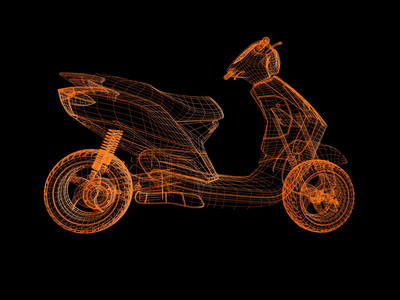|
Some people are never satisfied. Ignoring the fact that gasoline has done a terrific job of powering motorcycles for many years, they insist on exploring alternative fuels. Of course, there are good reasons. Although a small and lightweight motorcycle is an eco-friendly way of getting around town, gasoline is an imperfect fuel source. Exhaust emissions are top of the issues list. Modern machines are cleaner than those of yore, but still put out a cocktail of smog-creating chemicals— most notably, CO2. The source of the gasoline concerns many people too. Derived from oil, there's a finite supply, and much of it has to be imported. And last, in urban environments where two-wheeled transportation is at its most useful, the noise generated by those mechanical motorcycle parts is a significant problem. Electricity: The Obvious AlternativeA growing proportion of our electricity comes from renewables, but even when generated from coal or gas it's easier to control the emissions at source. An electric motorcycle has zero emissions at the point of use, but it has other selling points for biking enthusiasts. Electric motors generate instantaneous torque, making these machines remarkably quick. The smoothness is also a boon to riders, and the hush benefits everyone but those who love the throb of a Harley. Harley riders may enjoy maintaining their machines, but for most bikers it's a chore. Electric power eliminates many motorcycle parts like spark plugs, oil and filters, so maintenance costs are almost zero and reliability is exceptionally good. As with cars, the Achilles' heel of electric power is battery storage. The energy density of batteries is far less than that of gasoline, meaning range is limited. That's not necessarily a problem in cities though, where riders don't cover great distances, charging points are relatively plentiful, and regenerative braking puts power back into the battery. Brew Your Own?If batteries are such a nuisance, how about generating the electricity on-board when you need it? That's the idea behind fuel cells. These generate electricity from hydrogen, producing water as a byproduct. As Forbes reports, the technology is well established— car manufacturers like Honda and BMW have had fuel-cell development cars running for several years— and a number of motorcycle manufacturers are working on fuel-cell bikes. But if you want to buy one, you'll need to wait a while. Other fuel sources have been tried. An Argentinean motorcycle company, Zanella, promoted a bike that would run on compressed natural gas, while several enthusiasts have experimented with biodiesel. As a fuel, biodiesel is interesting because it's renewable, but the downsides are noise and exhaust emissions. This is Not Science FictionElectric motorcycles are available now from companies like Evolve, Brammo and Zero. There is more evidence that these are practical alternatives to the old gasoline machines. Consider this: Gizmag.com reports that police forces from Monterey, Calif. to London, England, have tested and are using electric motorcycles. So what's the future for eco-friendly motorcycles? Electric power is here but range concerns will likely hold back long-distance cruisers. Those folks will have to wait for fuel-cell bikes, but for city use the green motorcycle should satisfy most riders.
0 Comments
Leave a Reply. |


 RSS Feed
RSS Feed
